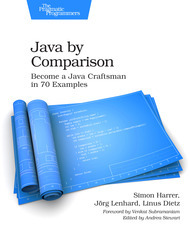What do you think?
Rate this book


206 pages, Paperback
Published March 21, 2018
Dieses Buch wagt sich an eine grosse Herausforderung: Wie kann man das über Jahre angeeignete Expertenwissen in einfacher Form Programmier-Anfängern zugänglich machen?
Die Autoren nutzen dazu 70 Beispiele, in denen ein funktionierender erster Wurf einer wartbaren und durchdachten L√∂sung gegen√ºbergestellt wird. Die Unterschiede lassen sich ohne grossen Aufwand direkt erkennen. In der Druckversion ist die Ausgangslage jeweils auf der linken Seite beschrieben und das Resultat sowie die Verbesserungen befinden sich auf der rechten Seite ‚Ä� dadurch hat man immer beides im Blick. Dies macht es nicht nur einfach die Ver√§nderungen zu sehen, sondern man bekommt gen√ºgend Kontext mitgeliefert, um den Unterschied zwischen beiden L√∂sungen auch zu verstehen.
Besonders gefallen hat mir der Teil aufräumen. Was als langweilige Pflichtaufgabe aussieht entpuppt sich als äusserst wertvolle Aktivität um den eigenen Code zu verbessern. Vereinfachte boolesche Ausdrücke, die Verhinderung von Negierung und der Verdeutlichung der eigentlichen Aufgabe sind Grundvoraussetzungen für wartbaren Code.
Die durchwegs aus der Praxis stammenden Beispiele werden gut und verständlich vermittelt. Daher ist dieses Buch aus meiner Sicht für alle Entwickler geeignet, die an wartbarem Code interessiert sind und sich verbessern wollen. Obwohl für Java geschrieben funktionieren fast alle Beispiele auch für .Net.